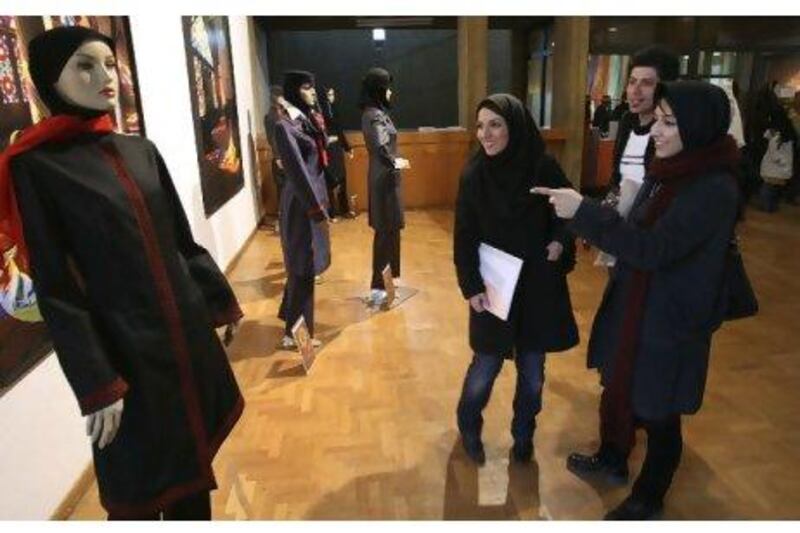Iranian men have been warned: jeans can make you infertile because they cause you to overheat. At least this is the opinion expressed by a young man in an interview aired on Iran's state television this month.
Ali Akbar Rafiepour was introduced as a "public speaker and strategist". His views, relayed by YouTube and Facebook, met with ridicule from Iranians at home and abroad.
What Iranians wear is a politically charged issue every sweltering summer, when the number of Islamic "morality police" on the streets is beefed up to ensure those wearing lighter clothing comply with the country's strict dress codes.
This year their ranks have swelled ominously, with 70,000 police officers deployed on fashion duty in Tehran, the state news agency, IRNA said.
The annual crackdown has traditionally targeted women. The authorities derogatorily brand as "mannequins" those who flout the rules by thrusting back their obligatory headscarves, wearing a dash of make-up or flashing a bit of ankle.
But every year throws up new twists. This summer men have been banned from sporting necklaces and other "bling". Last year, Iran published a catalogue of permissible "Islamic" hairstyles for men; a dab of gel is acceptable but ponytails and a spiked style known locally as the "rooster" are blacklisted.
Even so, Iranian men still have it far easier. They do not have to cover themselves head-to-toe like women and can wear short-sleeved shirts, although shorts are still outlawed.
Iran insists its "moral security plan" is designed to combat an insidious "western cultural invasion". But enforcing the dress code is also a means for the regime to demonstrate its power and divert attention from its other problems.
Politics and fashion are inextricably entwined in Iran, this year more than ever. The ruling elite is torn by an unprecedented power struggle, pitting President Mahmoud Ahmadinejad's camp against supporters of the supreme leader, Ayatollah Ali Khamenei.
The populist president, now fighting for his political survival, has often voiced his opposition to any overzealous crackdown on the dress code, concerned it could damage his government's popularity.
His supposed laxity came under ferocious attack this week from Mr Khamenei's representative to the Revolutionary Guards. Mojtaba Zolnour declared the president's men were "squeezing the throat" of morality police to blunt their drive against "moral corruption".
Meanwhile, Mr Raefipour, the denim-averse analyst, claimed on state television - which Mr Khamenei controls through appointed representatives - that the word "jeans" comes from "jinn".
Jinn, according to Islamic texts, are spirits that can assume animal or human form and which can be good or evil. Mr Raefipour also opined that soaring high heels make a woman's feet look like the hoofs of jinn, and that some logos and numbers on T-shirts signify devil worship.
Jinn are headline news in Iran. Mr Ahmadinejad's hardline rivals claim that a power-hungry, "deviant" faction in his camp has summoned evil jinn to spellbind the president, leaving him under its sway.
The etymology of jeans, incidentally, has nothing to do with jinn. The name for the blue cotton fabric is thought to derive from an old French term, "bleu de Gênes", referring to trousers made in the Italian port of Genoa for its wide-ranging sailors.
Only in the last century did jeans become a staple of western fashion. So popular are jeans in Iran that there has been no attempt to outlaw them, though hardliners view them as "decadent".
Men flouting the dress code are usually sent straight to the barber or home to change. Women, however, get a lecture on Islamic clothing and values.
"If they don't take action immediately and rectify the problem in their outfit, they will be arrested," Tehran's deputy police chief, Ahmad Reza Radan, told IRNA.
Then their families are asked to bring "appropriate" clothing to the police station. Detainees are freed only after signing a pledge "not to appear in public again like that", Mr Radan said. The practice of flogging women who broke the dress code ended in the mid-1990s.
Navigating the dress code's red lines is often difficult because they keep shifting. Enforcement was lax under Mr Ahmadinejad's reformist predecessor, Mohammad Khatami, when women began wearing tightfitting and knee-length outer coverings. Such apparel is now taboo, Mr Radan warned.
The regime's battle against the West's purported cultural onslaught goes beyond the sartorial. Iran's parliament recently raised the hackles of thousands of dog lovers by drafting a bill to criminalise owning canines in private apartments or exercising them in public.
Dogs are considered "unclean" in Islamic tradition, but it has become fashionable in upmarket north Tehran to keep them, especially expensive pedigrees. The parliamentary bill chides that, health hazards aside, owning dogs is a "blind imitation of vulgar western culture".
[ mtheodoulou@thenational.ae ]
msinaiee@thenational.ae





